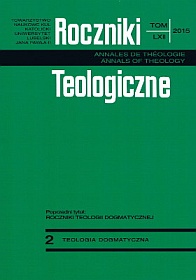Trynitarian-Communial Theology of Creation
Abstract
Creator of the world is the Triune God – the transcendent and immanent at the same time. Science reveals the universe evolving at all levels and the most important costitutive reason for theology is the relation of constant creation. Reflection of God's Communion in creation and communional sacramentality of created world are the foundation of Trynitarian-communional theology of creation. Theology distinguishes three models of interpreting the action of God in the world: through direct intervention, through the established order and through the active presence. The last model shows that the creation was accomplished not so much through the God's omnipotence and wisdom, but by the God's love. An important element of the Trinitarian understanding of creation is its Christological aspect and the theiosis of the universe opens the prospect of the final dimensions of this vision.
References
Bartnik Cz. S., Dogmatyka katolicka, t. II, Lublin 2003.
Dorschner J. (Hg.), Der Kosmos als Schöpfung. Zum Stand des Gesprächs zwischen Naturwissenschaft und Theologie, Regensburg 1998.
Eschatology from a Cosmic Perspective, red. G.F.R. Ellis, Philadelphia 2002.
Ganoczy A., Nauka o stworzeniu, tł. J. Fenrychowa, Kraków 1999.
Heller M., Teologia i Wszechświat, Tarnów 2009.
Kehl M., I widział Bóg, że to jest dobre. Teologia stworzenia, tł. W. Szymona, Poznań 2008.
Meuffels O., Theologie der Liebe in postmoderner Zeit, Würzburg 2001.
Peacocke A., Theology for a Scientific Age: Being and Becoming-Natural, Divine and Human, Minneapolis 1933.
Rahner K., Immanentne i transcendentne spełnienie świata, w: tenże, Pisma wybrane, t. II, tł. G. Bubel, Kraków 2007, s. 115-133.
Rahner K., Theological Investigations, vol. X, London 1973.
Resurrection: Theological and Scientific Assessment, red. T. Peters, R.J. Russell, M. Welker, Grand Rapids 2002.
Russell R.J., Cosmology: From Alpha to Omega, Minneapolis 2005.
Russell R.J., Stoeger W.R., Coyne G., Physics, Philosophy and Theology: A Common Quest for Understanding, Rzym 1988.
Scola A., Osoba ludzka. Antropologia teologiczna, tł. L. Balter, Poznań 2005.
Sobór Florencki, Sessio XI, Bulla unionis Coptorum (Cantate Domino) (1441), w: Dokumenty Soborów Powszechnych, t. III, red. A. Baron, H. Pietras, Kraków 2003, s. 570-619.
Sobór Konstantynopolitański I, Wyznanie wiary 150 Ojców, w: Dokumenty Soborów Powszechnych, t. I, red. A. Baron, H. Pietras, Kraków 2001, s 69 n.
Stoeger W.R., Key Developments in Physics Challenging Philosophy and Theology, w: Religion and Science: History, Method, Dialogue, red. W.M. Richardson, W.J. Wilman, New York 1996, s. 183-200.
Stoeger W.R., The Mind-Brain Problem, the Laws of Nature, and Constitutive Relationships, w: Neuroscience and the Person: Scientific Perspectives on Divine Action, red. R.J. Russell, N. Murphy, T.C. Meyering, M. Arbib, Rzym 1999, s.129-146.
Stoeger W.R., Divine Action in a Broken World, w: Science and Religion… and Culture in the Jesuit Tradition: Perspectives from East Asia, red. J.M.C. Francisco, R.M.G. de Jesus, Adelaide 2006, s. 7-22.
Stoeger W.R., Przedmowa, w: D. Edwards, Jak działa Bóg?, tł. M. Chojnacki, Kraków 2013.
The End of the World and the Ends of God: Science and Theology on Eschatology, red. J. Polkinghorne, M. Welker, Harrisburg 2000.
Copyright (c) 2015 Roczniki Teologiczne

This work is licensed under a Creative Commons Attribution-NonCommercial-NoDerivatives 4.0 International License.





